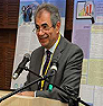The "Global South Decoding" column selects high-quality articles on economic or financial issues in developing countries from Forum for Economic and Financial Studies. This column delves into key issues in the economies of developing countries, providing readers with a unique perspective and revealing the latest developments in the economic and financial sectors of developing countries.
No. 1
How can "green finance" solve environmental problems through financing strategies?

doi: https://doi.org/10.59400/fefs.v1i1.356
The paper explores the concept of “green finance” and its role in addressing environmental issues through diverse funding strategies in China. It analyzes the factors driving renewable energy development in China from 2005 to 2022 using a unique method called “christened plate cointegration” and connectedness modeling. The study highlights the significance of encouraging environmentally responsible financing and involving private sector businesses in regional and global growth for long-term sustainability. The paper emphasizes the importance of cross-country dependence (CD) as a metric for analyzing interconnectedness between studied countries and suggests isolating the pass dependence for an impartial CD analysis. The study demonstrates that an increase in renewable energy usage leads to a rise in trademark registrations and financial development applications, and private sector involvement corresponds to the rise in trademarks and patents. Overall, the study emphasizes the significance of green financing in mitigating climate change and advancing sustainable growth, as well as the role played by private enterprises in local, national, and global development.
No. 2
Why has COVID-19 had a much greater impact on Arab bank depositors than on GDP and exchange rate fluctuations?

doi: https://doi.org/10.59400/fefs.v2i1.338
This study investigates the multifaceted impacts of COVID-19, GDP, exchange rates, unemployment, and economic policy uncertainty on bank depositors in Arab economies: Algeria, Comoros, Djibouti, Egypt, Iraq, Jordan, Lebanon, Libya, Mauritania, Morocco, Palestine, Somalia, Sudan, Syria, Tunisia, and Yemen, between 2017 and 2022. Using ordinary least squares analysis, the research uncovers significant relationships between these variables and banking indicators. COVID-19 has emerged as a dominant force, displaying a substantial and adverse link to the number of deposit accounts and depositors. While GDP, exchange rates, unemployment, and economic policy uncertainty also exhibit influences on banking metrics, their effects are comparatively smaller. This underscores the pandemic’s exceptional sway over banking behaviors within the region, emphasizing the pressing need to address COVID-19’s implications for financial stability and strategies to reinforce banking resilience amidst diverse economic challenges.
No. 3
The higher the unemployment rate, the stronger the informal economy?

doi: https://doi.org/10.59400/fefs2218
This paper investigates the relationship between unemployment and the informal economy in Uganda. Using annual time series data from Uganda, covering the period from 1991 to 2017, we apply the ARDL method to investigate this relationship. The results indicate a positive and statistically significant relationship between unemployment and the shadow economy in both the long- and short-run. This implies that an increase in unemployment increases the shadow economy in both the long- and short-run. These findings reveal that a high level of unemployment is detrimental to the formal economy since it spurs informal sector activities in both the short-and long-run. These results suggest that any attempt to regulate unemployment without tackling informal sector activities may not succeed unless they are addressed simultaneously. Furthermore, the results also imply that curbing informality requires implementing fiscal, economic and political reforms aimed at ensuring proper functioning of the business environment.
No. 4
Can increasing income and healthcare investment really curb infectious diseases?

doi: https://doi.org/10.59400/fefs458
Several countries in sub-Saharan Africa (SSA) suffer from economic hardship and high unemployment rates; furthermore, this region has higher rates of human immunodeficiency virus (HIV) and tuberculosis (TB). This study examined the relationships between HIV and TB, income, and total medical spending and its components, private and public healthcare expenditure, for 41 SSA countries. Random and fixed-effects models were utilized in this study to explore relationships by studying time series and cross-sectional panel data obtained from the World Bank. Results demonstrated that there is a positive relationship between HIV and unemployment and a negative relationship with income and medical spending. We also observed that, when private and public medical expenditures are compared, private medical expenditures alleviate the HIV epidemic. Considering the association with TB, income, total, and its components, private and public medical expenditures are negatively related. Since prevention of such life-threatening diseases as HIV and TB becomes vital to find remedies for, there is a need for more government initiatives, including job creation, increased productivity, and increased income levels, which can be seen as preconditions in fighting and controlling HIV and TB.
No. 5
Financial globalization: why has short-term cure become long-term poison?

doi: https://doi.org/10.59400/fefs.v2i2.1133
No country can achieve sustained economic growth without substantial investments in capital formation. Nigeria is rich in natural resources, but due to inadequate capital and technology, these resources have not been fully tapped and maximized. This study seeks to provide another gateway to unlocking the dearth of capital formation for development by specifically investigating the impact of financial and trade globalization on capital formation in Nigeria within the period 1990–2022. The autoregressive distributed lag (ARDL) technique was adopted for data analysis. The findings of this study indicate that while trade globalization has a negative effect on capital formation in both the long run and short run, respectively, financial globalization exerts a negative effect on capital formation in the long run but a positive effect in the short run. Nevertheless, financial and trade globalization exert detrimental effects on capital formation in the long run. A major policy recommendation is that Nigeria should play a key role in the African Continental Free Trade Area in order to boost her trade and financial competitiveness within Africa and so be able to lunch herself into the global space and thus tap the potential benefits of trade and financial globalization.




.jpg)
.jpg)









